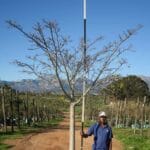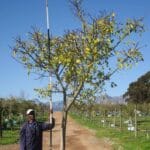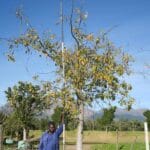Showing all 5 resultsSorted by latest
-
Sale!

Ficus Natalensis 200lt
Original price was: R4,950.00.R4,500.00Current price is: R4,500.00.Add to cartFicus Natalensis 200lt
Common Name: Natal Fig, Mutuba TreeFull Sun
Indigenous
Medium Watering
Wind TolerantFicus natalensis, commonly known as the Natal fig or the river sandpaper fig, is a species of fig tree native to various regions in Africa. It belongs to the Moraceae family, which includes other well-known fig species. Ficus natalensis is a large, evergreen tree that plays a significant ecological role in its native habitats.
Appearance: Ficus natalensis is a substantial tree that can reach heights of 15 to 30m or more. It has a spreading canopy and a dense crown of glossy green leaves.
Leaves: The leaves of Ficus natalensis are large, thick, and elliptical with prominent veins. They have a rough texture, which gives rise to the common name “river sandpaper fig.” The leaves are arranged alternately along the branches.
Figs: Like all fig trees, Ficus natalensis produces a unique fruit known as a syconium, which is a specialized structure that houses the flowers inside. These figs are an important food source for various animals, including birds and mammals, and play a role in the tree’s dispersal and reproduction.
Ecological Importance: Ficus natalensis is ecologically important in its native range as it provides food and habitat for various wildlife species. Many animals, including birds and monkeys, feed on its fruits, and some insects rely on the tree for shelter and breeding sites. Additionally, fig trees are well-known for their symbiotic relationship with fig wasps, which are crucial for pollination.
Distribution: The Natal fig is native to a wide range of countries in Africa, including South Africa, Mozambique, Zimbabwe, Zambia, and Tanzania.
Landscape Use: In some regions, Ficus natalensis is used as an ornamental tree for its large, attractive foliage and shade-providing qualities. However, due to its large size, it is generally more suitable for larger gardens or parkland areas.
-
Sale!

Ficus Natalensis 400lt
Original price was: R9,500.00.R7,450.00Current price is: R7,450.00.Add to cartFicus Natalensis 400lt
Common Name: Natal Fig, Mutuba TreeFull Sun
Indigenous
Medium Watering
Wind TolerantFicus natalensis, commonly known as the Natal fig or the river sandpaper fig, is a species of fig tree native to various regions in Africa. It belongs to the Moraceae family, which includes other well-known fig species. Ficus natalensis is a large, evergreen tree that plays a significant ecological role in its native habitats.
Appearance: Ficus natalensis is a substantial tree that can reach heights of 15 to 30m or more. It has a spreading canopy and a dense crown of glossy green leaves.
Leaves: The leaves of Ficus natalensis are large, thick, and elliptical with prominent veins. They have a rough texture, which gives rise to the common name “river sandpaper fig.” The leaves are arranged alternately along the branches.
Figs: Like all fig trees, Ficus natalensis produces a unique fruit known as a syconium, which is a specialized structure that houses the flowers inside. These figs are an important food source for various animals, including birds and mammals, and play a role in the tree’s dispersal and reproduction.
Ecological Importance: Ficus natalensis is ecologically important in its native range as it provides food and habitat for various wildlife species. Many animals, including birds and monkeys, feed on its fruits, and some insects rely on the tree for shelter and breeding sites. Additionally, fig trees are well-known for their symbiotic relationship with fig wasps, which are crucial for pollination.
Distribution: The Natal fig is native to a wide range of countries in Africa, including South Africa, Mozambique, Zimbabwe, Zambia, and Tanzania.
Landscape Use: In some regions, Ficus natalensis is used as an ornamental tree for its large, attractive foliage and shade-providing qualities. However, due to its large size, it is generally more suitable for larger gardens or parkland areas.
-
Sale!

Ficus Natalensis 1000lt
Original price was: R18,000.00.R11,500.00Current price is: R11,500.00.Add to cartFicus Natalensis 1000lt
Common Name: Natal Fig, Mutuba TreeFull Sun
Indigenous
Medium Watering
Wind TolerantFicus natalensis, commonly known as the Natal fig or the river sandpaper fig, is a species of fig tree native to various regions in Africa. It belongs to the Moraceae family, which includes other well-known fig species. Ficus natalensis is a large, evergreen tree that plays a significant ecological role in its native habitats.
Appearance: Ficus natalensis is a substantial tree that can reach heights of 15 to 30m or more. It has a spreading canopy and a dense crown of glossy green leaves.
Leaves: The leaves of Ficus natalensis are large, thick, and elliptical with prominent veins. They have a rough texture, which gives rise to the common name “river sandpaper fig.” The leaves are arranged alternately along the branches.
Figs: Like all fig trees, Ficus natalensis produces a unique fruit known as a syconium, which is a specialized structure that houses the flowers inside. These figs are an important food source for various animals, including birds and mammals, and play a role in the tree’s dispersal and reproduction.
Ecological Importance: Ficus natalensis is ecologically important in its native range as it provides food and habitat for various wildlife species. Many animals, including birds and monkeys, feed on its fruits, and some insects rely on the tree for shelter and breeding sites. Additionally, fig trees are well-known for their symbiotic relationship with fig wasps, which are crucial for pollination.
Distribution: The Natal fig is native to a wide range of countries in Africa, including South Africa, Mozambique, Zimbabwe, Zambia, and Tanzania.
Landscape Use: In some regions, Ficus natalensis is used as an ornamental tree for its large, attractive foliage and shade-providing qualities. However, due to its large size, it is generally more suitable for larger gardens or parkland areas.
-
Sale!

Ficus Natalensis 100lt
Original price was: R3,750.00.R1,895.00Current price is: R1,895.00.Add to cartFicus Natalensis 100lt
Common Name: Natal Fig, Mutuba TreeFull Sun
Indigenous
Medium Watering
Wind TolerantFicus natalensis, commonly known as the Natal fig or the river sandpaper fig, is a species of fig tree native to various regions in Africa. It belongs to the Moraceae family, which includes other well-known fig species. Ficus natalensis is a large, evergreen tree that plays a significant ecological role in its native habitats.
Appearance: Ficus natalensis is a substantial tree that can reach heights of 15 to 30m or more. It has a spreading canopy and a dense crown of glossy green leaves.
Leaves: The leaves of Ficus natalensis are large, thick, and elliptical with prominent veins. They have a rough texture, which gives rise to the common name “river sandpaper fig.” The leaves are arranged alternately along the branches.
Figs: Like all fig trees, Ficus natalensis produces a unique fruit known as a syconium, which is a specialized structure that houses the flowers inside. These figs are an important food source for various animals, including birds and mammals, and play a role in the tree’s dispersal and reproduction.
Ecological Importance: Ficus natalensis is ecologically important in its native range as it provides food and habitat for various wildlife species. Many animals, including birds and monkeys, feed on its fruits, and some insects rely on the tree for shelter and breeding sites. Additionally, fig trees are well-known for their symbiotic relationship with fig wasps, which are crucial for pollination.
Distribution: The Natal fig is native to a wide range of countries in Africa, including South Africa, Mozambique, Zimbabwe, Zambia, and Tanzania.
Landscape Use: In some regions, Ficus natalensis is used as an ornamental tree for its large, attractive foliage and shade-providing qualities. However, due to its large size, it is generally more suitable for larger gardens or parkland areas.
-

Ficus Natalensis 125lt
R4,290.00Add to cartFicus Natalensis 125lt
Common Name: Natal Fig, Mutuba TreeFull Sun
Indigenous
Medium Watering
Wind TolerantFicus natalensis, commonly known as the Natal fig or the river sandpaper fig, is a species of fig tree native to various regions in Africa. It belongs to the Moraceae family, which includes other well-known fig species. Ficus natalensis is a large, evergreen tree that plays a significant ecological role in its native habitats.
Appearance: Ficus natalensis is a substantial tree that can reach heights of 15 to 30m or more. It has a spreading canopy and a dense crown of glossy green leaves.
Leaves: The leaves of Ficus natalensis are large, thick, and elliptical with prominent veins. They have a rough texture, which gives rise to the common name “river sandpaper fig.” The leaves are arranged alternately along the branches.
Figs: Like all fig trees, Ficus natalensis produces a unique fruit known as a syconium, which is a specialized structure that houses the flowers inside. These figs are an important food source for various animals, including birds and mammals, and play a role in the tree’s dispersal and reproduction.
Ecological Importance: Ficus natalensis is ecologically important in its native range as it provides food and habitat for various wildlife species. Many animals, including birds and monkeys, feed on its fruits, and some insects rely on the tree for shelter and breeding sites. Additionally, fig trees are well-known for their symbiotic relationship with fig wasps, which are crucial for pollination.
Distribution: The Natal fig is native to a wide range of countries in Africa, including South Africa, Mozambique, Zimbabwe, Zambia, and Tanzania.
Landscape Use: In some regions, Ficus natalensis is used as an ornamental tree for its large, attractive foliage and shade-providing qualities. However, due to its large size, it is generally more suitable for larger gardens or parkland areas.
